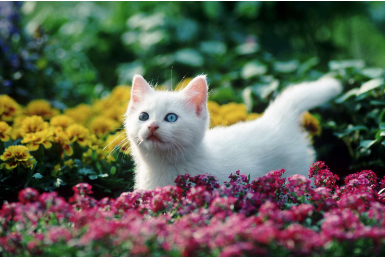In a world where pets are often given common and sometimes mundane names, botanical names offer a fresh, elegant, and meaningful alternative. Naming your cat after a plant or flower not only adds a unique touch but also imbues your pet’s identity with symbolic significance. This comprehensive article delves into the enchanting world of botanical names for cats, exploring their origins, meanings, and the beauty they bring to our feline companions.

The Allure of Botanical Names
Historical Significance
Botanical names have been used for centuries, originating from Latin and Greek languages, which were historically used to classify and describe plant species. These names often encapsulate characteristics of the plants they denote, making them rich in meaning and history. This deep-rooted historical significance adds an extra layer of charm when applied to naming cats.
Cultural Impact
Different cultures have long held plants and flowers in high regard, often associating them with deities, myths, and legends. For instance, in ancient Egypt, the lotus flower was a symbol of rebirth and the sun, making “Lotus” a poignant name for a resilient or bright-spirited cat. Understanding these cultural impacts can help pet owners choose names that resonate with their values and the personalities of their cats.
Symbolism and Meaning
Plants and flowers carry profound symbolic meanings. A cat named “Lily” might embody purity and beauty, while “Sage” could reflect wisdom and tranquility. These symbolic meanings can provide deeper connections between pet and owner, making the name more than just a label but a reflection of the cat’s essence.
Choosing the Perfect Botanical Name
Factors to Consider
- Personality of the Cat: Consider the cat’s behavior and demeanor. A playful kitten might suit a lively name like “Daisy,” while a serene, older cat might be better named “Fern.”
- Physical Appearance: Sometimes, a cat’s appearance can inspire its name. For instance, a white cat could be called “Snowdrop,” and a sleek black cat might be named “Onyx.”
- Personal Significance: Personal experiences and preferences play a significant role. Perhaps a certain flower has sentimental value or a particular herb is a favorite in your household.
Popular Botanical Names
Flowers
- Rose: Symbolizes love and beauty. Suitable for a graceful and affectionate cat.
- Lily: Represents purity and elegance. Ideal for a serene and poised feline.
- Daisy: Denotes innocence and cheerfulness. Perfect for a playful and energetic kitten.
Herbs
- Sage: Conveys wisdom and calmness. Fits a wise and composed cat.
- Basil: Symbolizes royalty and courage. A strong name for a brave and noble cat.
- Thyme: Represents strength and endurance. Ideal for a resilient and hardy cat.
Trees
- Willow: Symbolizes flexibility and resilience. Suitable for a cat that adapts well to change.
- Maple: Denotes strength and balance. A great name for a sturdy and well-balanced feline.
- Aspen: Represents courage and determination. Fits a bold and adventurous cat.
Rare and Exotic Names
For those looking for something truly unique, consider names like:
- Amaryllis: A striking flower that symbolizes pride and determination.
- Zinnia: A vibrant flower representing lasting affection.
- Acacia: A tree symbolizing protection and immortality.
Comprehensive Research on Botanical Names
Etymology and Classification
The etymology of botanical names often reveals interesting stories and characteristics of plants. For example, the name “Lavender” comes from the Latin “lavare,” meaning “to wash,” reflecting its historical use in bathing and washing. Understanding these roots can enhance the meaning behind a cat’s name.
Scientific Classification
Botanical names are part of a hierarchical system used to classify and identify plants. This system, known as binomial nomenclature, includes the genus and species of the plant. For instance, “Rosa canina” refers to the common dog rose. While most pet names won’t include the full scientific designation, understanding this system can provide a greater appreciation for the name’s origin.
Cultural and Mythological References
Many botanical names have ties to mythology and folklore. For example, the flower “Narcissus” is linked to the Greek myth of Narcissus, a young man who fell in love with his reflection. Naming a cat “Narcissus” could be fitting for a particularly self-assured feline. These mythological connections add depth and intrigue to the names.
Organizing the Content
Flowers and Their Meanings
Roses: The Queen of Flowers
Roses are renowned for their beauty and variety. A cat named “Rose” or any of its varieties, like “Rosie” or “Rosalind,” carries connotations of love, beauty, and elegance. Different colors of roses also hold various meanings—red for love, white for purity, and yellow for friendship.
Lilies: Elegance and Purity
Lilies symbolize purity and refined beauty. A cat named “Lily” or “Lillian” could be seen as a pure and graceful presence in the household. The various types of lilies, such as “Tiger Lily” or “Calla Lily,” offer additional naming options with specific attributes.
Daisies: Cheerfulness and Innocence
Daisies represent innocence and cheerfulness. They are perfect names for playful and joyful cats. Variants like “Daisy Mae” or “Marguerite” (the French name for daisy) can add a unique twist.
Herbs and Their Significance
Sage: Wisdom and Tranquility
Sage is known for its wisdom and calming properties. Naming a cat “Sage” suggests a wise and serene nature. It also reflects the herb’s historical use in cleansing and medicinal practices.
Basil: Royalty and Courage
Basil, often associated with royalty, symbolizes courage and bravery. A cat named “Basil” could be seen as a noble and courageous companion.
Thyme: Strength and Endurance
Thyme represents strength and endurance, making it a fitting name for a resilient and strong-willed cat. The herb’s hardy nature reflects these attributes.
Trees and Their Symbolism
Willow: Flexibility and Resilience
The willow tree symbolizes flexibility and resilience due to its ability to bend without breaking. A cat named “Willow” could embody these traits, making it a suitable name for an adaptable and resilient pet.
Maple: Strength and Balance
Maple trees are known for their strength and balance. A cat named “Maple” suggests a well-balanced and sturdy character, ideal for a dependable and balanced feline.
Aspen: Courage and Determination
Aspens are known for their courage and determination, thriving in challenging environments. A cat named “Aspen” would reflect a bold and adventurous spirit.
Adding Visual Elements
Table of Botanical Names and Meanings
| Botanical Name | Meaning | Suitable for |
|---|---|---|
| Rose | Love, beauty | Graceful cats |
| Lily | Purity, elegance | Serene cats |
| Daisy | Innocence, cheerfulness | Playful kittens |
| Sage | Wisdom, tranquility | Wise, calm cats |
| Basil | Royalty, courage | Brave, noble cats |
| Thyme | Strength, endurance | Resilient cats |
| Willow | Flexibility, resilience | Adaptable cats |
| Maple | Strength, balance | Balanced cats |
| Aspen | Courage, determination | Adventurous cats |
Conclusion
Botanical names for cats offer a beautiful and meaningful way to name your feline friends. These names are rich in history, culture, and symbolism, making them more than just labels but reflections of your cat’s personality and your personal values. Whether you choose a common flower name or an exotic herb, each botanical name carries a story and significance that can deepen your bond with your pet.
FAQs
What are some popular botanical names for female cats?
Popular botanical names for female cats include Rose, Lily, Daisy, and Sage. These names are not only beautiful but also carry significant meanings.
Can botanical names be used for male cats?
Absolutely! Names like Basil, Thyme, and Aspen are great options for male cats. These names convey strength, courage, and resilience.
Are botanical names suitable for all cat breeds?
Yes, botanical names are versatile and can suit any cat breed. The key is to choose a name that reflects the cat’s personality and characteristics.
How do I choose the best botanical name for my cat?
Consider your cat’s personality, appearance, and any personal significance the name may have. Reflect on the symbolic meanings of different plants and flowers to find a name that resonates with you and your cat.
Where can I find more information on botanical names?
Books on botany, gardening websites, and cultural mythology sources are great places to explore the meanings and histories behind botanical names.
Additional Resources
- The Language of Flowers: A History
- Botanical Names and Their Meanings
- Cultural Significance of Plants and Flowers
Before publishing, ensure to review the content for any spelling or grammatical errors and refine the language to maintain clarity and professionalism.






